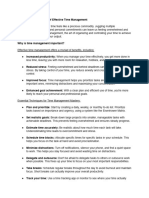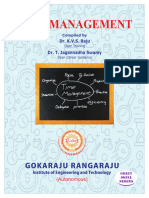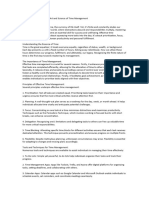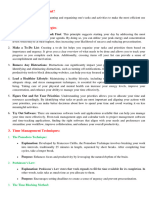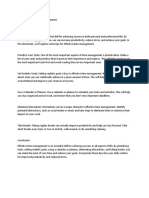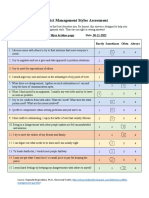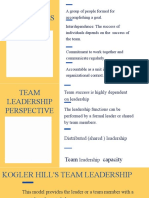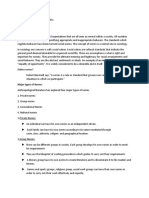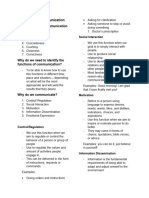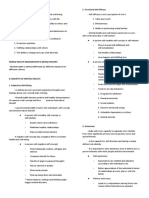Time Management: A Key to Success
Introduction
Time management is the process of organizing and planning how to divide your time between
different tasks. Good time management enables you to work smarter, not harder, so you can
accomplish more in less time. It is an essential skill for students, professionals, and anyone
looking to improve productivity and reduce stress.
Effective time management involves setting goals, prioritizing tasks, and maintaining a
structured schedule to enhance efficiency. It is particularly beneficial for students, as it helps
them balance academics, extracurricular activities, and personal time. Professionals, on the other
hand, rely on time management to meet deadlines, maintain work-life balance, and achieve
career growth. Proper time management also allows for improved mental and physical well-
being by reducing stress and avoiding burnout.
Importance of Time Management
1. Increases Productivity: Proper time management helps in prioritizing tasks, leading to
higher efficiency. By efficiently organizing time, one can accomplish more in a day than
they would otherwise.
2. Reduces Stress: By managing time effectively, you can avoid last-minute rushes and
reduce anxiety. Knowing that your tasks are under control brings peace of mind.
3. Enhances Decision Making: With a structured schedule, you can allocate time for
important decisions without feeling rushed. When people are not under time pressure,
they tend to make more rational and well-thought-out choices.
4. Improves Work-Life Balance: Managing time well ensures that both professional and
personal life get adequate attention. This prevents burnout and ensures that time is spent
on leisure and self-care activities as well.
5. Boosts Confidence: When you manage your time efficiently, you are more likely to meet
deadlines and achieve goals, which boosts self-confidence and motivation.
6. Promotes Self-Discipline: Practicing good time management helps develop a habit of
discipline, which is valuable in all aspects of life.
7. Better Quality of Work: Proper time allocation allows for more attention to detail,
leading to improved work quality and output.
8. Helps Achieve Long-Term Goals: Good time management ensures that small daily
actions contribute to larger life ambitions and aspirations.
Principles of Time Management
1. Setting Goals: Define short-term and long-term goals to have a clear focus. Goals give
direction and purpose to your activities.
2. Prioritization: Use the Eisenhower Matrix to differentiate between urgent and important
tasks. Prioritizing ensures that critical tasks are completed first.
� 3. Planning: Create daily, weekly, and monthly schedules to stay on track. Planning in
advance prevents last-minute hassles and confusion.
4. Avoiding Procrastination: Break tasks into smaller steps and set deadlines.
Procrastination is one of the biggest time-wasters, and managing it leads to improved
efficiency.
5. Delegation: Assign tasks when possible to save time for more critical activities.
Delegating work ensures that you do not get overwhelmed with too many responsibilities.
6. Using Tools and Techniques: Utilize planners, calendars, and time-tracking apps to
streamline activities. These tools help keep track of deadlines and pending tasks.
7. Time Tracking: Monitoring how much time is spent on different activities helps identify
areas for improvement.
8. Creating a Routine: A daily structured routine fosters consistency and discipline in
managing time.
Effective Time Management Techniques
1. Pomodoro Technique: Work for 25 minutes and take a 5-minute break to maintain
focus. This helps in improving concentration and preventing burnout.
2. 80/20 Rule (Pareto Principle): Focus on 20% of tasks that contribute to 80% of the
results. Identifying these high-impact tasks ensures maximum productivity.
3. Time Blocking: Allocate specific time slots for different activities. This prevents
distractions and keeps the schedule structured.
4. ABC Method: Categorize tasks as A (urgent), B (important), and C (less important). This
classification ensures that crucial tasks are completed first.
5. Eat That Frog Technique: Complete the most challenging task first to reduce
procrastination. This technique ensures that difficult tasks are tackled early in the day
when energy levels are high.
6. The Two-Minute Rule: If a task takes less than two minutes, complete it immediately.
This prevents small tasks from piling up and consuming more time later.
7. Batch Processing: Group similar tasks together to complete them efficiently in one go.
8. The Eisenhower Box: A method to categorize tasks into urgent-important, important-not
urgent, urgent-not important, and neither urgent nor important.
Challenges in Time Management
1. Distractions: Social media, phone calls, and unnecessary meetings can waste time.
Identifying and minimizing distractions help improve efficiency.
2. Lack of Motivation: Without clear goals, staying on track becomes difficult. Setting
rewards and maintaining self-discipline can help boost motivation.
3. Overcommitment: Saying yes to too many tasks can lead to burnout. Learning to say no
and setting realistic expectations prevent overburdening.
4. Poor Planning: A lack of structured planning results in confusion and inefficiency.
Proper scheduling and organizing daily tasks can mitigate this issue.
5. Multitasking: While it might seem efficient, multitasking often reduces productivity.
Focusing on one task at a time leads to better results.
6. Unrealistic Goals: Setting unachievable goals can lead to frustration and demotivation.
� 7. Fatigue and Burnout: Poor time management leads to excessive workload, which can
cause stress and exhaustion.
Strategies for Overcoming Time Management Challenges
1. Create a To-Do List: Having a list of tasks helps in tracking progress and staying
organized.
2. Set Deadlines: Self-imposed deadlines can boost motivation and ensure timely
completion of work.
3. Eliminate Distractions: Designate a workspace free from distractions to maintain focus.
4. Take Breaks: Short breaks improve concentration and prevent mental fatigue.
5. Use Time Management Apps: Tools like Trello, Todoist, and Google Calendar help in
structuring daily tasks effectively.
6. Regularly Review and Adjust Schedules: Continuous evaluation ensures optimal use of
time.
7. Practice Self-Care: Proper sleep, exercise, and nutrition contribute to better focus and
productivity.
Conclusion
Effective time management is crucial for success in all aspects of life. By setting goals,
prioritizing tasks, and using effective techniques, individuals can maximize productivity, reduce
stress, and achieve a balanced lifestyle. Developing this skill requires practice, but with
dedication, anyone can master the art of managing time efficiently. Whether you are a student, a
working professional, or a homemaker, applying these strategies can significantly improve your
efficiency and overall quality of life.
In a fast-paced world, time is the most valuable asset. Those who manage it well have a
competitive advantage in every field. Implementing good time management habits today can
lead to long-term success and fulfillment. As the saying goes, "Time is money," and utilizing it
wisely can lead to a prosperous and stress-free life. Time management is not just about getting
things done; it is about living a structured, fulfilling, and well-balanced life. The better you
manage your time, the more control you have over your future.














